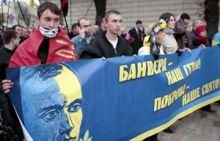The long story about awarding the title of Hero of Ukraine to Shukhevych and Bandera has come to an end. Not so good an end. The High Administrative Court of Ukraine has upheld the ruling of the Donetsk District Administrative Court which pronounced unlawful the previous president Viktor Yushchenko’s decrees to award UPA commander-in-chief Roman Shukhevych and OUN leader Stepan Bandera the title of Hero of Ukraine. It will be recalled that during one of his first visits to Moscow as president, Viktor Yanukovych promised to finally “solve” this problem. Did the president really intend to solve it this way?
It may be true that Yushchenko’s abovementioned decrees were premature because this should have been preceded with public explanation work. But canceling the decrees only deepens, instead of solving, the problem. Decisions of this kind will hardly increase stability in society, while tension will only be on the rise. “I protested before, during, and after the decoration of Bandera and Shukhevych because in the current situation this act only splits society,” historian Stanislav Kulchytsky told a press conference yesterday. “Both leaders of the Ukrainian national liberation movement deserve the title of Hero of Ukraine at least because they fought for the Ukraine that we have been building for 20 years now. But, as long as the Ukrainian nation is divided now, it is not a very good idea to speak today about the heroization of these persons. It is only a serious effort to make people study the history of Ukraine, not the history of the USSR, that can put an end to this debate.”
Volodymyr Olentsevych and Anatolii Soloviov from Donetsk were claimants in the court. According to Ukraina moloda, “it turned out that this gentleman (Olentsevych – Ed.) has filed dozens of lawsuits in the past six years or so, demanding that presidential decrees on the official decoration of many well-known personalities be pronounced unlawful and overturned. In particular, Olentsevych appealed against the heroization of Vasyl Stus and Oleksa Hirnyk. In all these cases, the courts rejected his claims and refused to satisfy his appeals.” Yet it was the other way round in the case of Bandera and Shukhevych. Tellingly, the Donetsk District Administrative Court rejected his suits dozens of times in 2007-2008 on the grounds that it was not authorized to hear those cases, and even if the court did hear some of them, it handed down negative rulings. But when Yanukovych came to power in early 2010, the situation changed. The courts began to hear the suits and, moreover, to pass judgments in favor of the claimant. For example, “while on October 29, 2009, the Donetsk District Administrative Court refused to satisfy Soloviov’s claim, as soon as April 21, 2010, the Donetsk Court of Appeal handed down a ruling that was diametrically opposite to its own decision of May 12, 2009, and satisfied Soloviov’s appeal, pronouncing the decree unlawful,” Ukraina moloda says.
The current leadership’s humanitarian policy is raising a lot of questions. President Yanukovych is so far not fulfilling his promises to rally society together. On the contrary, certain actions of the leadership are disuniting society. We can all remember the head of state’s statements that the 1932-33 Holodomor was not an act of genocide, persecution of historian Ruslan Zabily, and searches at the National Memorial Museum of the Victims of Occupation Regimes “Prison on Lontsky Street.” We can see today that the leadership is giving the green light to the Odesa authorities in their attempts to advance Russian World in the south. There is a similar situation on the church-state relations. President Yanukovych visits only one church - the Ukrainian Orthodox Church of the Moscow Patriarchate – and ignores others. In other words, the leadership is imposing its own values, taking into account the interests of only a part of society and leaving the other part to tend to its own interests.







